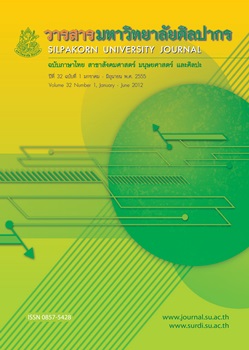ก้าวสู่ประชาคมเศรษฐกิจอาเซียน 2015 : ข้อท้าทายหลักสูตรการท่องเที่ยวและการผลิตบุคลากรของประเทศเวียดนาม Step Forwards the ASEAN Economic Community 2015: Challenges to Vietnam Tourism Education and Capacity Builders
Main Article Content
Abstract
บทคัดย่อ
การศึกษานี้วิเคราะห์สถานการณ์การจัดการหลักสูตร จุดอ่อนและจุดแข็งของการจัดการหลักสูตรการบริการและการท่องเที่ยวของมหาวิทยาลัยในประเทศเวียดนามและแนวทางการสร้างความร่วมมือของสถาบันการศึกษาในประชาคมเศรษฐกิจอาเซียนเพื่อสร้างความเข้าใจอันดีและการแลกเปลี่ยนทางวิชาการ โดยใช้การวิจัยเอกสาร การสำรวจตัวอย่างโดยใช้แบบสอบถามเก็บข้อมูลจากอาจารย์หัวหน้าสาขาการบริการและ/หรือการท่องเที่ยวเฉพาะในมหาวิทยาลัยที่มีคณะที่เปิดสอนหลักสูตรนี้ทั้งหมด 40 แห่ง รวมจำนวนหน่วยตัวอย่างทั้งสิ้น 40 คนและการจัดประชุมเฉพาะกลุ่มรวม 2 ครั้งที่ Hanoi University และที่ Thai Nguyen University of Economics and BusinessAdministration (TUEBA) ซึ่งใช้เทคนิคเดลฟาย และวิธีการสุ่มแบบเจาะจงในการเลือกกลุ่มผู้ให้ข้อมูล รวม 14 คนปัจจุบันมหาวิทยาลัยผลิตบัณฑิตได้เพียงร้อยละ 50 ของความต้องการแรงงานของอุตสาหกรรมการท่องเที่ยว หลักสูตรมีจุดแข็งด้านการจัดการ เช่น หลักสูตรมีความทันสมัย การจัดประสบการณ์การเรียนรู้นอกสถานที่ การเสริมสร้างประสบการณ์ด้านการปฎิบัติแก่นักศึกษาและมีอาจารย์ผู้สอนที่มีความเชี่ยวชาญ ส่วนจุดอ่อนคือ การสนับสนุนงบประมาณจากรัฐบาล นอกจากนี้รัฐบาลของประเทศสมาชิกอาเซียนควรส่งเสริมความร่วมมือระหว่างมหาวิทยาลัยในอาเซียนในทุกด้านรวมถึงการสนับสนุนงบประมาณในการสร้างเครือข่ายและพันธมิตรทางวิชาการ และการแลกเปลี่ยนด้านวิชาการและมหาวิทยาลัยในอาเซียนควรเพิ่มความร่วมมือในการแลกเปลี่ยนด้านวิชาการ การจัดประชุมวิชาการสัมมนาและการทำวิจัยร่วมกันระหว่างผู้ทรงคุณวุฒิด้านการท่องเที่ยว อาจารยแ์ละนักศึกษาระหว่า่งสถาบันในอาเซียน
คำสำคัญ: 1. ประชาคมเศรษฐกิจอาเซียน. 2. หลักสูตรการท่องเที่ยว. 3. การผลิตบุคลากรของประเทศเวียดนาม.
Abstract
The paper analyzed the situation of curricula management, weaknesses and strengths of thehospitality and tourism management programs at undergraduate level in Vietnam and guidelines to establishacademic collaboration among universities in ASEAN to strengthen the good understanding and academicexchange. Data was collected using documentary research, a questionnaire survey of the chairs of hospitalityand/or tourism programs in 40 universities, with a total sample groups of 40 persons, and two focus groupmeetings at Hanoi University and Thai Nguyen University of Economics and Business Administration (TUEBA),employing Delphi Technique and purposive sampling methods to select the key informants with total of 14persons. At present, the universities could supply only 50 % of the graduates needed for tourism industry.The management of the hospitality and tourism programs strengths were in terms of the updated curricula,the provision of exposure in learning activities, the strengthening of practical experience for the students andthe qualified teaching staff. The common weakness is inadequate financial support from the government.Furthermore, the governments of ASEAN member countries should promote and adequately subsidize thecooperative networks among universities for academic exchanges. The universities should enhance thecollaboration in terms of academic exchanges, academic conferences and seminars and research amongthe scholars in the tourism industry, instructors and students among the ASEAN institutions.
Keywords: 1. The ASEAN Economic Community. 2. Tourism education. 3. Capacity builders of Vietnam.


